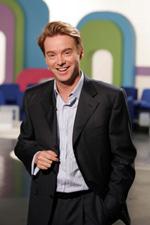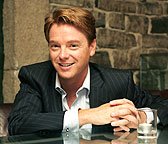Agenda bender

He has made himself into a very marketable franchise in media, consulting and laterally, show business. John Byrne profiles David McWilliams on the launch of his début book.
David McWilliams did not coin the term "Celtic Tiger," as was claimed in The Irish Times last week, and in pretty much every media outlet over the past decade. It was a British economist called Kevin Gardiner, who first used the metaphor in a report on the Irish economy in 1994 for stockbrokers Morgan Stanley. So how on earth did attach itself for so long to the McWilliams name?
"It was a sub-editor in The Sunday Business Post. Blame Damien Kiberd [then editor of the paper and friend of McWilliams]. I had nothing to do with it, and I've been telling everyone since that it is inaccurate," he says. "And also, I was introduced on the Late, Late Show by Gay Byrne as 'the man who coined the phrase "Celtic Tiger"' which was probably another reason."
Did he point out the mistake to Gay Byrne?
"Well, I was a young man on the Late, Late for the first time, I was a bit overwhelmed by the whole thing, so no."
Whatever about the genesis of the McWilliams-Celtic Tiger myth, it has been a useful one for the Dublin-born economist who is now at the highest point in his media career. He hosts his own daytime chat-show, The Big Bite, on RTÉ four days a week, writes a weekly column in The Sunday Business Post and regularly appears as a panelist on current affairs shows.
 His first book, The Pope's Children: Ireland's New Elite, was published on Wednesday 16 November ("an intriguing and provocative look at the Irish generation born in the early 1980s in the wake of the Pope's visit," according to the publicity hype). A combination of pop sociology and accessible economics, it is a blitz of labels such as "Kell's angels", "the baby belt" and "wonder-bra economics." It has been serialised by the Irish Independent and has seen McWilliams featured on the front of most national newspapers.
His first book, The Pope's Children: Ireland's New Elite, was published on Wednesday 16 November ("an intriguing and provocative look at the Irish generation born in the early 1980s in the wake of the Pope's visit," according to the publicity hype). A combination of pop sociology and accessible economics, it is a blitz of labels such as "Kell's angels", "the baby belt" and "wonder-bra economics." It has been serialised by the Irish Independent and has seen McWilliams featured on the front of most national newspapers.
Not bad for an economist. But these days, McWilliams is as much an entertainer as a number-cruncher. Ambitious, clever and marketable, he has oodles of media savvy and is a master of the soundbite. "Economics is like the medieval Catholic Church. It is stifling debate, it's stifling people's imaginations. It's bullying people" he told The Irish Times.
But there is a suspicion about David McWilliams – ultimately he is a triumph of style over substance, no economic analysis, wouldn't have him doing a serious economic analysis, they say.
There is also the problem that he has been predicting the collapse of the Irish property market since 1997.
McWilliams is not discomforted. "There are lots of better economists in Ireland than me who spend a lot more time looking at figure. I did my time with that kind of thing when I was working in the Central Bank. I'm no longer interested in pure economics. I'm now more interested in demographics, looking at trends, sociology, and coming up with ideas."
Born in middle-class, south side Dublin 39 years ago, David McWilliams was schooled as a border in rugby stronghold Blackrock College and studied at Trinity College, Dublin. From there he worked in the Central Bank as an economist, and after that for a European Bank, UBS. But economics began to bore him, and he sought to expand his work. He had appeared on CNN while on trips to Eastern Europe and the Middle East, and his ebullient, fast-talking style marked him out as somebody who could perform on camera. The McWilliams agenda moved from economics to broadcasting.
When he returned to Ireland in 2000, he was already credited with inventing the term which symbolised the new-found Irish wealth. TV3 hired him to host its deference to current affairs programming, Agenda. It was a success. He started a weekly column with The Sunday Business Post, which was also a success, sharp, chirpy, substantial. He was recruited to host the Newstalk breakfast programme, when the station opened in April 2002. Not a success because the station's local news focus didn't dovetail with his interest in international affairs, and because his economics/business perspective and patter was too limiting, especially head-to-head with RTE's most successful radio programme, Morning Ireland.
His media career fell apart in one cruel week in summer 2004 when Agenda was axed and Eamon Dunphy replaced him on Newstalk. It was a difficult time, but the support of his wife, Sian, a solicitor with Arthur Cox, and his young son and daughter helped. Friends like bar owner Jay Burke were important too.
A brief period in relative wilderness followed, but then the comeback in autumn 2004: The Big Bite. A daytime chat gig in the mould of the old Kilroy Show on BBC, it mixes human interest with light current affairs and has received some favourable reviews. He misses the more heavyweight material of Agenda and the daily buzz of two hours live radio.
Contemporary and former colleagues know a dynamic, clever, bitchy man who loves to perform at dinner parties, has abundant self-confidence and has an ability to wing it on any subject. And although he may not have coined the Celtic Tiger phrase, he's probably coining it: his combined media salaries, plus property interests (he is coy about this) and lucrative gigs like advising Fine Gael how to rebrand itself successfully.
The David McWilliams franchise is doing well.
